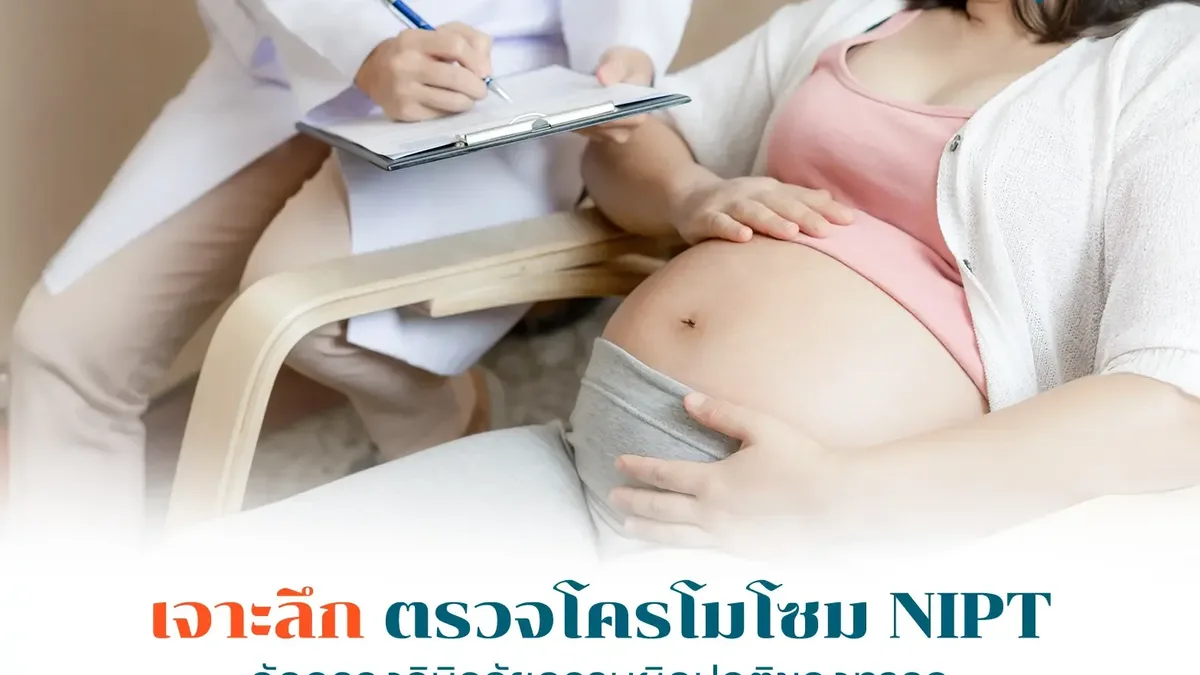While expectant mothers often focus on maintaining good health to prepare for childbirth and ensure their baby’s well-being, NIPT chromosome screening is also an important part of prenatal care. However, many mothers are still unfamiliar with what NIPT (Non-Invasive Prenatal Testing) actually is, why it's done, how effective it is, and whether it is suitable for every pregnant woman.
What Is NIPT? A Closer Look at Chromosome Screening During Pregnancy
NIPT (Non-Invasive Prenatal Testing) is a blood test performed on the mother to assess the risk of chromosomal abnormalities in the fetus. It analyzes the amount of DNA (specifically, cell-free DNA) present in the mother's blood using a technology called Massively Parallel Sequencing. In pregnant women carrying a baby with Down syndrome, an abnormal amount of cell-free DNA from chromosome 21 can be detected.
The effectiveness of NIPT in screening for Down syndrome is extremely high. It can detect Trisomy 21 (Down syndrome) in approximately 99% of cases, with a false positive rate of less than 1%. In comparison, other commonly used screening methods—such as nuchal translucency (NT) scan, combined test, triple test, and quadruple test—have detection rates ranging from only 60% to 85%.
Why Should You Get NIPT Chromosome Testing?
NIPT chromosome testing is an important consideration for those preparing for pregnancy.
NIPT (Non-Invasive Prenatal Testing) is a screening test used to detect potential chromosomal abnormalities in a fetus. It can assess the risk of Down syndrome and other significant chromosomal disorders. If the analysis indicates a high risk, doctors will usually recommend additional diagnostic tests, such as amniocentesis, to confirm the positive result found in the NIPT screening.
Advantages of NIPT Chromosome Testing
- In addition to commonly testing for abnormalities in chromosome 21, it can also screen for abnormalities in chromosomes 13, 18, and sex chromosomes.
-
It is highly accurate, up to 99%, with a low false positive rate. This helps reduce unnecessary amniocentesis procedures for confirmation, making the pregnancy safer than other methods.
-
It is simple and convenient, requiring only a blood draw from the mother, and results are available quickly.
NIPT: What Are Its Limitations?
However, NIPT also has certain limitations. It may not be suitable for individuals in the following situations:
- Mothers who have received a blood transfusion within the past year
- Mothers who have undergone holistic treatments involving animal stem cell or placental injections
- Mothers who have received immunotherapy treatments
- Mothers currently diagnosed with cancer
- Mothers with known chromosomal abnormalities
Which chromosomal disorders does NIPT help detect?
Screening for Down Syndrome (Trisomy 21)
NIPT can screen for Down syndrome, which is caused by the presence of an extra copy of chromosome 21. It is the most common chromosomal disorder. Affected babies typically have a small, flat head, upward slanting eyes, a flat nasal bridge, low-set ears, a small mouth with a protruding tongue, and may have a heart septal defect. They often experience developmental delays and typically have below-average IQ.
Screening for Edwards Syndrome (Trisomy 18)
NIPT can screen for Edwards syndrome, caused by an extra copy of chromosome 18. Affected babies may have a small head and jaw, low-set ears, cleft lip or palate, clenched hands or deformed fingers and toes, and defects in the heart, kidneys, lungs, and digestive system. Intellectual disability is severe, and most affected infants do not survive beyond the first year of life.
Screening for Patau Syndrome (Trisomy 13)
NIPT can detect Patau syndrome, which results from an extra copy of chromosome 13. Babies with this condition often have cleft lip and palate, small eyes, low-set ears, extra fingers or toes, deafness, and severe brain abnormalities. Most affected newborns survive only a few weeks after birth.
Sex Chromosome Aneuploidy and Fetal Sex Determination
NIPT can screen for abnormalities in the number of sex chromosomes and determine the fetal sex (XX for female, XY for male). In addition to identifying fetal gender, it can detect sex chromosome aneuploidies such as Turner syndrome (XO), Triple X syndrome (XXX), Klinefelter syndrome (XXY), and Jacob's syndrome (XYY). Early detection of these conditions allows for more comprehensive and effective medical planning and care.
Microdeletions
Microdeletion testing can identify chromosomal disorders caused by the loss of small segments of chromosomes. Conditions that can be detected include:
- DiGeorge syndrome (22q11.2 deletion)
- 1p36 deletion syndrome
- Prader-Willi syndrome / Angelman syndrome
- Cri-du-chat syndrome (5p deletion)
- Wolf-Hirschhorn syndrome (4p deletion)
Genome-Wide Aneuploidy Detection
Beyond the common trisomies (13, 18, 21) and sex chromosomes, NIPT can also screen for aneuploidies across the remaining 19 autosomal chromosome pairs. This genome-wide screening provides a broader overview of chromosomal abnormalities that may affect fetal development.





